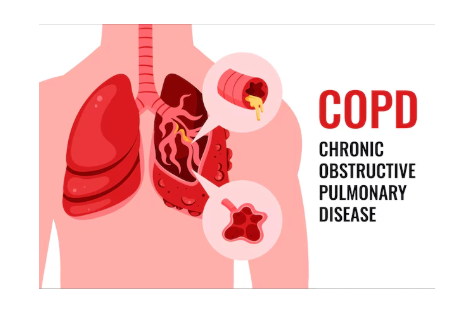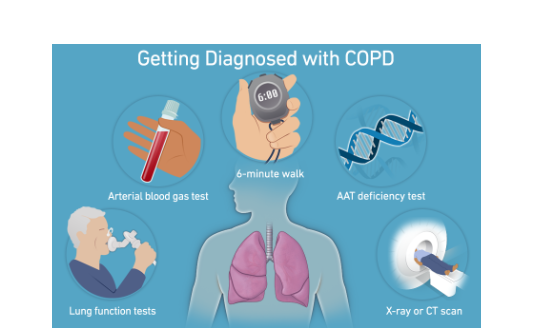By: Geraldus Sigap
Breathing is something we often take for granted until it becomes difficult. Feeling short of breath, struggling to take deep breaths, or experiencing a persistent cough can disrupt daily life and signal a more serious underlying condition. One of the most common causes of breathing difficulties is Chronic Obstructive Pulmonary Disease, commonly known as COPD. COPD is a long-term condition that affects the lungs and makes it harder to breathe over time.

Symptoms of COPD can start subtly and progress slowly, often leading people to mistake them for normal signs of aging or minor health issues. Difficulty breathing during physical activity, a persistent cough that produces mucus, wheezing, and frequent chest tightness are common early indicators. People with COPD may also experience recurrent respiratory infections, which can exacerbate symptoms and further damage lung tissue. Recognizing these symptoms early is critical. If you find yourself frequently out of breath or coughing for weeks at a time, it is time to take your concerns to a healthcare professional for evaluation.
The leading cause of COPD is long-term exposure to irritants that damage the lungs. Understanding these risk factors can help you take steps to reduce your chances of developing the condition:
- Smoking: Smoking is the most significant risk factor for COPD. It damages the lungs and airways, and even exposure to secondhand smoke can increase the risk.
- Air Pollution: Long-term exposure to polluted air, industrial fumes, and dust can contribute to COPD.
- Occupational Hazards: Jobs that involve exposure to chemicals, dust, or fumes, such as mining or construction, increase the likelihood of developing COPD.
- Genetics: A genetic condition called alpha-1 antitrypsin deficiency can predispose some individuals to COPD, even if they have never smoked or been exposed to pollutants.
- Respiratory Infections: Frequent lung infections during childhood can affect lung development and increase the risk of COPD later in life.
Screening for COPD involves simple tests that can provide valuable insights into your lung health. Early detection allows for timely intervention, which can slow disease progression and improve your quality of life. Screening typically includes:
- Spirometry: This is a non-invasive test that measures how much air you can inhale and exhale, as well as how quickly you can exhale. It is the most common test used to diagnose COPD.
- Chest X-ray or CT Scan: Imaging tests can help identify damage to the lungs and rule out other conditions, such as lung cancer or heart disease.
- Blood Tests: These can measure oxygen levels in the blood and identify any underlying genetic conditions, such as alpha-1 antitrypsin deficiency.

Figure 1. Screening for COPD
While there is no cure for COPD, effective management can significantly improve symptoms and prevent further lung damage. Here are some key strategies:
- Quit Smoking: If you smoke, quitting is the single most effective step you can take to slow the progression of COPD. Avoiding secondhand smoke and other lung irritants is equally important.
- Medications: Inhalers and other medications can help open airways, reduce inflammation, and manage symptoms.
- Pulmonary Rehabilitation: This program includes exercise, breathing techniques, and education to help patients manage their symptoms and improve their quality of life.
- Oxygen Therapy: In advanced cases, supplemental oxygen may be needed to ensure the body gets enough oxygen.
- Vaccinations: Staying up-to-date on flu and pneumonia vaccines can prevent respiratory infections that can worsen COPD symptoms.
Prevention is always better than treatment. To reduce your risk of developing COPD, consider these lifestyle changes:
- Avoid smoking and exposure to secondhand smoke.
- Use protective equipment if you work in an environment with dust, chemicals, or fumes.
- Maintain a healthy diet and exercise regularly to support lung health.
- Minimize exposure to air pollution by staying indoors on high-pollution days and using air purifiers at home.
At RS Abdi Waluyo, we understand the importance of early detection and comprehensive care for respiratory conditions like COPD. Our team of experienced pulmonologists specializes in diagnosing and managing lung diseases, providing personalized treatment plans tailored to each patient’s needs.
With access to state-of-the-art diagnostic tools, including spirometry and imaging tests, RS Abdi Waluyo ensures accurate and timely diagnoses. Our pulmonary rehabilitation programs are designed to help patients improve their lung function, manage symptoms, and enjoy a better quality of life. Whether you are at risk for COPD, experiencing respiratory symptoms, or seeking preventive care, our team is here to support you every step of the way.
Resources
- Chronic Obstructive Pulmonary Disease (COPD) Diagnosis | Temple Health [Homepage on the Internet]. [cited 2024 Nov 27];Available from: https://www.templehealth.org/services/conditions/chronic-obstructive-pulmonary-disease-COPD/diagnosis
- Agarwal AK, Raja A, Brown BD. Chronic Obstructive Pulmonary Disease [Homepage on the Internet]. In: StatPearls. Treasure Island (FL): StatPearls Publishing, 2024 [cited 2024 Nov 27]; Available from: http://www.ncbi.nlm.nih.gov/books/NBK559281/
- COPD – Symptoms and causes – Mayo Clinic [Homepage on the Internet]. [cited 2024 Nov 27];Available from: https://www.mayoclinic.org/diseases-conditions/copd/symptoms-causes/syc-20353679
